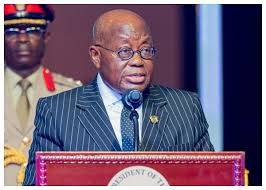Akufo-Addo Wants to Kill Ghanaians – Kwaku Annan Claims: Analyzing the Allegations
In recent weeks, a political storm has erupted in Ghana following controversial claims by Kwaku Annan, a media personality and former host of “The Seat†on Net 2 TV. Annan’s bold accusation that President Nana Addo Dankwa Akufo-Addo allegedly “wants to kill Ghanaians†has sparked both outrage and curiosity across the nation. These comments, made on his personal platform, have garnered widespread attention and further fueled political tensions in the country. In this article, we will dissect the basis of these claims, the context in which they were made, and the potential consequences they may have on public discourse and the political landscape.
The Allegations
Kwaku Annan’s claims stem from a broader criticism of Akufo-Addo’s administration, particularly concerning its handling of the country’s economy and public health policies. Annan, who has been vocal in his opposition to certain government policies, suggested that the president’s decisions are intentionally designed to harm citizens. His allegations point specifically to recent economic hardships, rising cost of living, and the perceived mismanagement of critical sectors such as health and education.
In a series of public statements, Annan highlighted the increasing struggles faced by Ghanaians, particularly under the weight of inflation, unemployment, and access to healthcare. He questioned the sincerity of the government’s efforts to address these issues, insinuating that some of the policies were deliberately harmful. “Akufo-Addo has shown no interest in improving the lives of Ghanaians, and his actions reflect a disregard for the people,†Annan claimed, emphasizing that the president’s motives could be far more sinister than mere incompetence.
Economic Crisis and Policy Decisions
The basis of Annan’s accusations can be tied to the ongoing economic challenges that Ghana has been facing. The country’s inflation rate, which has skyrocketed to over 40%, coupled with a weak currency and high levels of public debt, has left many Ghanaians struggling to make ends meet. The rising cost of basic commodities, fuel, and utilities has only exacerbated the situation, leading to widespread dissatisfaction among the public.
Additionally, Annan’s accusations coincide with recent protests by civil society groups and labor unions who have criticized the government for failing to implement effective solutions to the economic crisis. Some sectors of society, particularly the youth, have expressed frustration over the lack of job opportunities and the government’s perceived inability to create a conducive environment for business growth. This growing discontent has provided fertile ground for claims like Annan’s, which tap into a broader sense of frustration and disenchantment with the current administration.
Health and Social Welfare Concerns
Annan has also criticized the government’s handling of the healthcare system, which has been strained in recent years. He pointed to shortages in medical supplies, inadequate infrastructure, and challenges in accessing quality healthcare as evidence of neglect by the Akufo-Addo administration. According to Annan, these issues, combined with the economic crisis, have led to a situation where the government is “failing to protect the lives of ordinary Ghanaians.â€
This claim is bolstered by ongoing concerns over the state of public health, particularly in the wake of the COVID-19 pandemic. While Ghana’s response to the pandemic was initially lauded for its swift action in imposing lockdowns and rolling out vaccines, the long-term impact on the health sector has been significant. Many Ghanaians continue to face challenges in accessing healthcare, and the pandemic exposed underlying weaknesses in the system that have yet to be fully addressed.
Political Ramifications
Kwaku Annan’s comments have been met with mixed reactions. Some critics see his statements as overly sensational and politically motivated, aimed at stirring up opposition to the government ahead of upcoming elections. Others, however, argue that his claims reflect a legitimate frustration with the current state of affairs in Ghana. Political analysts have warned that such statements, whether true or not, could further deepen divisions within the country and escalate tensions between supporters of the New Patriotic Party (NPP) and the opposition National Democratic Congress (NDC).
The Akufo-Addo administration has yet to officially respond to Annan’s allegations, but members of the NPP have dismissed the claims as baseless and part of a broader smear campaign against the president. Some government officials have accused Annan of using his platform to promote falsehoods and incite fear among the population, a tactic they say is common among opposition figures seeking to undermine the government’s credibility.
Conclusion
The accusations leveled by Kwaku Annan against President Akufo-Addo represent a new chapter in Ghana’s politically charged atmosphere. While it is essential to critically examine the government’s policies and their impact on the population, claims that the president is deliberately seeking to harm citizens must be scrutinized carefully. As the nation moves toward its next electoral cycle, the challenge for Ghanaians will be to sift through the noise and focus on substantive issues that truly affect their lives. Whether Annan’s allegations hold weight or are dismissed as political grandstanding, they underscore the heightened tension in Ghana’s political landscape today.


